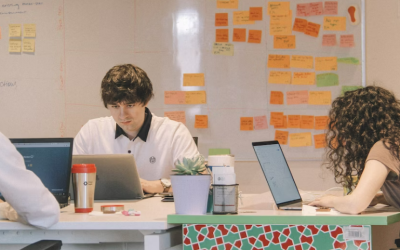Cyber Security – Our Collective Responsibility
As the TV presenter, Anne Robinson used to say, “You are the weakest link.” We are now starting to see attempted cyber-attacks on many companies from Russia. Small companies are not immune to a foreign cyber-attack. Still, a focus on a cyber-attack can be on individual users, trying to gain access to systems by obtaining user passwords. Short passwords can especially be the object of a brute force attack.
A cyber security attack can range from a loss of personal data to extortion and identity theft. It is important to realise that you, as an individual, are an attractive target to attackers, and it can happen to anyone, anytime, anywhere, and on any device. Don’t ever say, “It won’t happen to me.” Even small steps you take as an individual can go a long way in boosting your defence against cyber attacks.
Cyber Safety Tips to Boost Your Defence
As an individual, you can enforce the following methods that can help you be more secure from malicious attacks on your day-to-day activities.
- Use Strong Passwords: Use a strong mix of characters, and don’t use the same password for multiple sites. Don’t share your password with others, and don’t write it down — No Post-It note attached to your monitor! If you have trouble remembering your passwords, consider using a secure password vault. Then you only have to remember one (very strong) password.
- 2-Factor Authentication: Sometimes, even a strong password won’t cut it. Add an extra layer of security to make sure that your accounts are heavily protected. It ensures that you have accessed the account and not someone else. Most 2-factor authentications use mobile apps to generate an OTP that expires after a short period.
- Beware of Suspicious Emails: Always be careful when clicking on attachments or links in an email. If an email is unexpected or suspicious, don’t click on it. To be frank, this should be second nature by now.
- Stay Up to Date: Update your hardware and software regularly. Software updates usually contain bug fixes that will ensure that there are no exploits in your software that could harm your data security. Having updated hardware will ensure that all new software is supported.
- Safely Store Sensitive information: Confidential files used in your business and those files containing sensitive information about your users must be stored in a secure location. The files should be encrypted while they are in transit. This helps to avoid unauthorised access.
- Don’t Leave Your Devices Unattended: If you need to leave your computer, phone, or tablet for any length of time, no matter how short. Lock the screen so no one can use it while you’re gone. This also extends to your flash drive, hard drive, and other storage devices.
- Use a Trusted Network: Sensitive browsing, such as banking or shopping, should only be done on a device that belongs to you, on a network that you trust. Whether you’re using a friend’s phone, a public computer, or free Wi-Fi at a coffee shop, your data could be copied or stolen.
- Always Use an Antivirus: Make sure your antivirus software is always turned on and updated. Cyber attackers can spread malware through infected flash drives, external hard drives, and smartphones. Do not regard your anti-virus warnings as a hoax.
- Stay Safe on Social Media: Watch what you’re sharing on social networks. Criminals can find you and quickly access a shocking amount of information, such as where you go to school, where you work, and when you’re on vacation. Such information could help them gain access to more valuable data.
- Steer Clear of Social Engineering: Be wary of social engineering, where someone attempts to gain information from you through manipulation. If someone calls or emails you asking for sensitive information like login information or passwords, it’s okay to say no. You can always contact the company directly to verify credentials before giving out any information.
- Constantly Monitor Your Accounts: Be sure to monitor your accounts for any suspicious activity. If you see something unfamiliar, it could signify that you’ve been compromised. Don’t be afraid to speak up and immediately tell your security contact if you notice anything unusual.
Conclusion
Every collective responsibility starts with individual effort. The risks of cyber threats are still unknown. There are many possibilities of exploits that crop up now and then. In most cases, the cyber threat comes from someone close to you or your organisation. You must do your small part in taking a stand against cyber attacks.
LogicMelon
Award-winning recruitment software that will find, attract, hire and analyse the way you want to work. At LogicMelon, we have experienced software recruitment marketing specialists to help you build effective recruitment solutions supported by the best customer service you’ll find anywhere!
Email: sales@logicmelon.com or call LogicMelon (UK) +44 (0) 203 553 3667 (USA) +1 860 269 3089
Agile Recruitment: What Is It, What Are the Benefits, and How Do I Implement It?
The world has witnessed the positive impact an agile approach can have on accomplishing projects and collaborating.
10 Time Management Skills that Every Employee Needs
Time management skills are crucial for a business to achieve its goals. The workplace is dynamic, and employees must adapt to the change.
How to Create an ATS Friendly Resume
The ATS-friendly resume is a document passed through the ATS (Applicant Tracking System).To pass the ATS scan, the resume has to be formatted properly and include the right words. Read the blog to know more.


